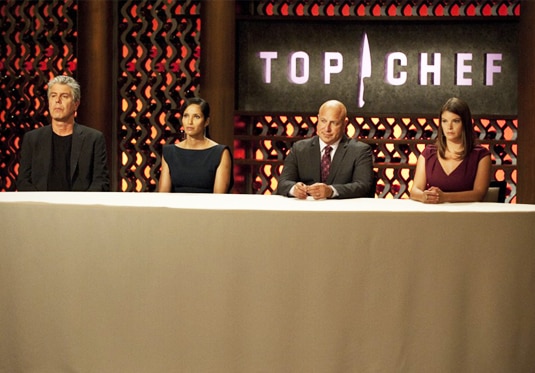
Create a free profile to get unlimited access to exclusive videos, sweepstakes, and more!
Electric Feel
Gail Simmons lays down the ground rules for this unique season.

This one feels a little different.
After seven seasons of Top Chef, two seasons of Top Chef Masters and right on the heels of Top Chef: Just Desserts, I think it is safe to say I have met my share of new cheftestants. By this point, I have the whole thing down to a science. I know exactly what to expect from our first day of shooting, I have a time-tested system for remembering all their names at the first Elimination Challenge, I know more or less how well (or sometimes how poorly) each chef will do, having never anticipated how hard it is to cook under these conditions, and perhaps most of all, I realize how nervous and full of optimism they are as they stand before us at that first Judges’ Table.
All that said, within minutes of entering the Russian Tea Room for the start of Top Chef All-Stars, I tossed my assumptions and usual routine right out the door. For the first time on our show, I experienced a feeling that caught me completely off guard: nerves! I felt anxious and excited, as well as ill-prepared for what we were about to do. I could sense it before I even saw our returning chefs in person. It was palpable, but subtle, as slight as a change in barometric pressure, as certain as Tom’s shiny head. This season was going to be very different.
My angst was confirmed as soon as we were seated at the dinner table, surrounded by many of our strongest eliminated competitors from seasons past. I remembered them all well, partially because I have had the opportunity to get to know most of them personally since they last stood in front of us. I have shared meals and attended events with them, and have been lucky enough to eat at some of their restaurants across the country. But what shocked me was how clearly I remembered their food, their cooking styles, and their personalities in the kitchen. My first instinct was to smile, reach out and welcome them back, like I would a long-lost friend. But I could sense as they stared at us across the table that a friendly reunion was not in the cards. If I remembered so much about each of them, they surely had crystal clear memories of me in this circumstance too.
I know what you are thinking. At that moment I was thinking it too: How will this intimate knowledge affect our judging? Will it give some an advantage? How will they react? More is at stake this season, in both prize money and reputation, with all 18 seeking either retribution or redemption. It is hard not to consider all of this from the start. So, as we begin our next great adventure together, let me assure you of a few ground rules:
1) I have never regretted a decision I have made on this show and am not about to start second-guessing now. Rest assured, our judging is as impartial and balanced as ever. After all, that is why we are a panel of four. We keep each other in check and base our decisions on honest and thorough discussion, including all sides of an argument for both winning and losing chefs. We do not see what goes on in the house, in their private interviews, or most of what happens in the kitchen before we eat. As always, we judge each challenge in isolation, on the food put in front of us that specific day. It is the only way the challenges work. A chef cannot win by resting on his or her laurels, or on how well (or poorly) we suspect they can cook. They still need to prove it every time. That is also why we usually have a guest judge, who does not have our history with the chefs, does not know what they cooked last week or last season — or what they cook in their restaurants back home. 2) Be careful what you wish for… For years I have wondered why our chefs rarely talk back to us and why many do not fight harder to stay in the game. It is, of course, all about confidence. Apparently we are an intimidating group when you first meet us, but bringing these chefs back made me realize how quickly formality dissolves the second time around. I am not saying they do not respect our judgments, but they are more fiesty now than ever before, as they should be. For the most part, this is a good thing. I could not believe how different it felt to speak with them all at Judges’ Table. They know exactly how the game works and are not going home without a serious battle. Their intensity from the onset and their familiarity with the situation kept us on our toes all season and, I believe, will make for some heated and truly outrageous Top Chef moments. After watching this first episode, I assume you know exactly what I mean….
3) Watch your back, but keep your eyes on your fries. Don’t for one instant think that because time has passed since they were last on the show, any of them have settled down or lost their edge. Sure, they have changed and matured both personally and in their professional careers (we all have to some degree, right?). But they have more to win — and lose — this time around, and they know it all too well. As hard as they may have been on us this season, they pushed each other even harder, demanded more from themselves and achieved it in the most surprising ways. So don’t get too comfortable with any preconceived notions you have. You will soon learn, as I did, that none of it matters.
Okay, onward.
This first Elimination Challenge forced them all to face their demons. Each chef was asked to prepare an improved take on the dish that sent them home in their respective seasons. We did not want to see each dish completely reinvented, but rather reconfigured as a better version of its former self. Most of our cheftestants did just that, and we were pleased with many of the results. Eating a dish you have had before, but do not remember fondly, sets up certain expectations as well as negative associations. Dale Talde, Antonia, Spike, Casey, and Mike Isabella showed us how much better their dishes could be. Jamie’s Pan-Seared Black Bass, Celery, Green Peppercorn Sauce & Herb Salad was a vast improvement over her effort in Season 5, when she practically gave up on her attempt to remake one of Eric Ripert’s signature dishes. Richard Blais finally cooked us the dish I knew he wanted to in Puerto Rico for the finale of Season 4. His Braised Pork Belly with Bread & Butter Radishes, Mirin & Cheddar was melt-in-your-mouth tender, with crispy skin and bright garnishes that balanced it perfectly. Unfortunately, he was so determined to get it right that he plated past his allotted time. Punishing him for this may have seemed unfair, but there was little we could do, as the tapes confirmed his mistake. Certainly not grounds for elimination, but not an action we could reward. Rules are rules. Angelo knew just how to tweak his Homemade Ramen with Sweet Glazed Pork & Watermelon –- by taking out the weak tea infusion and intensifying the flavors that supported the rich pork and noodles. His use of watermelon was astoundingly simple and delicious. I would eat it again right now if I could. We all agreed -- his dish deserved the Most Improved Plate Award.
That was the easy part. Eliminating our first All-Star was much harder. Several plates at our table were still unsuccessful, including Fabio’s Handmade Caserecci, Crawfish & Crab Stew and Stephen’s confusing and complicated Lobster Harumaki, Kumamoto Oyster Sabayon and Deconstructed Crab Soup Dumplings. All poorly reimagined and not improved upon much at all. In discussing them, we realized they both suffered from poor conception –- no act of reconstruction could have made them that much better. Stephen actually had not played a major role in designing the original dish. Fabio gave us what could have been a decent stew but presented it in a way that was totally unappealing. Not only was the platter with paper a misstep, but he stewed the ingredients to such an extent that the flavors became muddled and murky. At least it was bold and risky, and showed us who he was. Although his attempt at rustic pasta was ill conceived, I did not find it as inedible as others did. Elia’s Red Snapper Steamed in Ti Leaf with Snapper Jus was another matter altogether. It appeared to be a simple and seemingly straightforward plate. The first time around it was bland and the ti leaf was not cooked through. Her second version was not any better, which awed us, as it could have been the easiest dish of all to improve. Maybe she took the challenge too literally, but she seemed to have made no attempt to give it any more personality or flavor. Adding insult to injury, many portions of her fish were not cooked through. Some were downright raw. This should have been the most basic part of the equation –- Cooking 101, actually.
It was awful to see her go. To know her potential and know we would not get to see her blossom was upsetting for all of us. I knew in that moment that EVERY elimination during the season will feel this way. There are no weak links here, no one who cannot keep up with the rest. Every one of them will tug at our hearts as they leave the Top Chef kitchen, because we know how talented, how passionate and how hungry they all are. Makes for some difficult choices for us, but one heck of a good ride for you. Enjoy it


